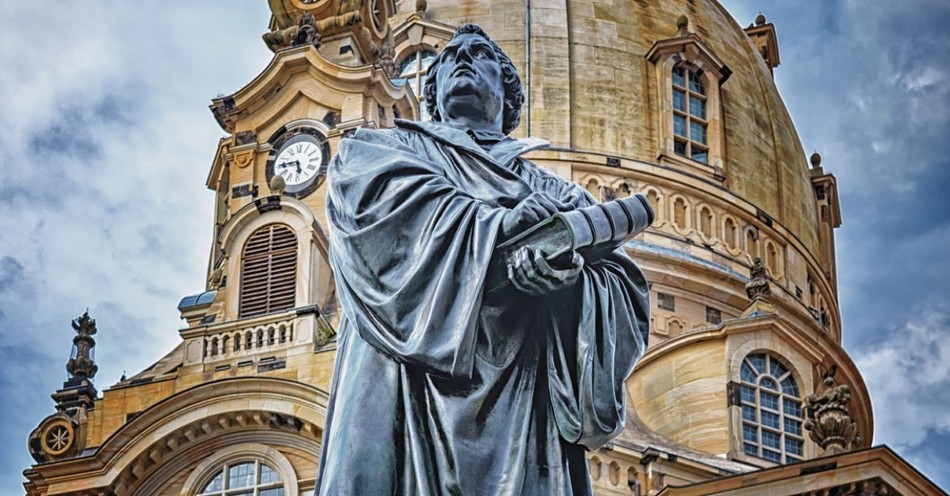What Is Reformation Day?
Reformation Day, annually occurring on October 31, honors Luther’s posting of his 95 Theses on the Castle Church doors in Wittenberg, Germany, on October 31, 1517. This holiday is largely exclusive to Protestants as a commemoration of the origin of the Protestant Reformation. Luther's 95 theses sparked the Reformation, as they were quickly translated and spread across Germany within weeks.
Dr. Ray Pritchard writes: "on Reformation Day, we pause to give thanks to God for Martin Luther and for the recovery of the gospel truth that we are declared righteous in the eyes of God solely based on what Jesus Christ accomplished for us in his bloody death and victorious resurrection."
Martin Luther, desiring to spark theological discussion over the medieval practice of selling indulgences, nailed his 95 Theses on the door of the Castle Church in Wittenberg, Germany. That happened 503 years ago today. The spark he set off ignited a flame that spread across Europe and became known as the Protestant Reformation. By challenging the church's authority and its doctrine, Luther reclaimed for Christianity the central doctrine of salvation-justification by faith alone.
Luther took a bold and dangerous step as he nailed a paper to the door of a Cathedral in Wittenberg, Germany, on which he had written 95 complaints against the only Christian community of his day - his own Church. It went down in history as the beginning of the Protestant Reformation. The protests that were written that day for the public to see began the most dramatic reform within Christianity.
Reformation Day in 2023
Reformation Day is traditionally observed on October 31, the same day as Halloween. In numerous German states, it is a public holiday; likewise, many branches of the government and court system are often closed.
In the United States, this holiday is often observed on the Sunday preceding Halloween, a day recognized as Reformation Sunday, which will be October 29, 2023.
Why is Reformation Day the same as Halloween?
Reformation Day and Halloween fall on the same date, October 31st, primarily due to historical and cultural factors. October 31st, the day Martin Luther nailed his theses to to the church doors, as significant in the Roman Catholic liturgical calendar as All Hallows' Eve, the night before All Saints' Day, which is observed on November 1st. All Saints' Day was a day set aside to honor all the saints recognized by the Catholic Church. All Hallows' Eve, or Halloween, was a preparation for this feast day. As Halloween gained popularity as a secular holiday with festivities on the evening of October 31st, it coincided with the historical date of Reformation Day. This cultural overlap of a religious observance and a secular holiday resulted in both being celebrated on the same date.
To learn more, read: Reformation Day and It's Connection to Halloween
Meaning and Importance of Reformation Day
The Protestant Reformation was the proclamation of the justification doctrine—that is, salvation by grace alone (Galatians 2:21) through faith alone in Christ alone. It was also an objection against degradation within the Roman Catholic Church. The century before the Reformation was characterized by public concern with the exploitation of the leaders in the Roman Catholic Church, along with its false doctrines, biblical illiteracy, and superstition. In Rome, monks, priests, bishops, and popes taught unbiblical dogmas like the sale of indulgences, the treasury of merit, purgatory, and salvation through good works.
In Martin Luther's own words:
"I greatly longed to understand Paul's Epistle to the Romans and nothing stood in the way but that one expression, ‘the justice of God,' [Rom. 1:17] because I took it to mean that justice whereby God is just and deals justly in punishing the unjust. My situation was that, although an impeccable monk, I stood before God as a sinner troubled in conscience, and I had no confidence that my merit would assuage him. Therefore I did not love a just and angry God, but rather hated and murmured against him.
"Yet I clung to the dear Paul and had a great yearning to know what he meant. Night and day I pondered until I saw the connection between the justice of God and the statement that ‘the just shall live by his faith' [Rom. 1:17]. Then I grasped that the justice of God is that righteousness by which through grace and sheer mercy God justifies us through faith. Thereupon I felt myself to be reborn and to have gone through open doors into paradise. The whole of Scripture took on a new meaning, and whereas the ‘justice of God' had filled me with hate, now it became to me inexpressively sweet in greater love. This passage of Paul became to me a gate of heaven…."(see Of First Importance)
Who Celebrates Reformation Day?
Reformation Day is primarily celebrated in Lutheran and some Reformed (Calvinist) churches. It is a special day to remember and reflect upon the historical and theological significance of the Protestant Reformation. This day presents an opportunity for churchgoers to focus on the key principles of the Reformation, such as justification by faith alone and the authority of Scripture. Although it is not as widely observed as some other religious holidays, it holds great significance for those within the Protestant tradition who recognize it.
Battle-Cry of the Reformation: A Mighty Fortress is Our God
Martin Luther believed that church music was for everyone to sing. "The devil who is the originator of sorrowful anxieties and restless trouble flees before the sound of God's music almost as much as before the Word of God," Luther declared.
With that inspiration, he composed the hymn, "A mighty fortress is our God." It is a bold affirmation of our powerful and loving God:
"A mighty fortress is our God. A bulwark never failing.
Our helper He amid the flood of mortal ills prevailing.
For still our ancient foe, doth seek to work us woe.
His craft and power are great, And armed with cruel hate,
On earth is not His equal."
From the writings of Professor Kenneth Osbeck in 101 Hymn Stories, we read that Luthers' famous hymn is the most powerful one of the Protestant Reformation. Osbeck writes: "It became the battle cry of the people, a great source of strength. This hymn has been translated into practically every known language and is regarded as one of the noblest and most classic examples of Christian hymnody."
Sources
Reformation Day: A Mighty Fortress is Our God | Christianity.com
Reformation Day by Dr. Ray Pritchard | Christianity.com
Photo by form PxHere
Christianity.com's editorial staff is a team of writers with a background in the Christian faith and writing experience. We work to create relevant, inspiring content for our audience and update timely articles as necessary.


.jpg)
.jpg)
